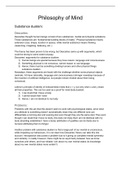Samenvatting
Summary Philosophy of Mind 2020
- Instelling
- Vrije Universiteit Amsterdam (VU)
This is a summary of the Philosophy of Mind course of . It covers many different subjects, theories and thinkers. Subjects include mind-body dualism, determinism, free will, neuroscience, artificial intelligence, type-token theory, computationalism, and much more
[Meer zien]




